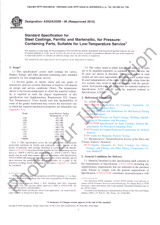Wir benötigen Ihre Einwilligung zur Verwendung der einzelnen Daten, damit Sie unter anderem Informationen zu Ihren Interessen einsehen können. Klicken Sie auf "OK", um Ihre Zustimmung zu erteilen.
ASTM E2056-04(2016)
Standard Practice for Qualifying Spectrometers and Spectrophotometers for Use in Multivariate Analyses, Calibrated Using Surrogate Mixtures
Automatische name übersetzung:
Standard Praxis für die Qualifikation Spektrometern und Spektralfotometer für den Einsatz in Multivariate Analysen, mit geeichten Surrogate MischungenNORM herausgegeben am 1.4.2016
Informationen über die Norm:
Bezeichnung normen: ASTM E2056-04(2016)
Anmerkung: UNGÜLTIG
Ausgabedatum normen: 1.4.2016
SKU: NS-637690
Zahl der Seiten: 10
Gewicht ca.: 30 g (0.07 Pfund)
Land: Amerikanische technische Norm
Kategorie: Technische Normen ASTM
Kategorie - ähnliche Normen:
Die Annotation des Normtextes ASTM E2056-04(2016) :
Keywords:
fluorescence spectroscopy, infrared spectroscopy, molecular spectroscopy, multivariate analysis, quantitative analysis, Raman spectroscopy, spectrometer qualification, spectrophotometer qualification, ultraviolet-visible spectroscopy,, ICS Number Code 71.040.50 (Physicochemical methods of analysis)
Ergänzende Informationen
| Significance and Use | ||||||||||||||||||||||||||||||||
|
5.1 This practice should be used by the developer of standard test methods that employ surrogate calibrations. 5.1.1 This practice assists the test method developer in setting and documenting requirements for the spectrometer/spectrophotometers that can perform the test method. 5.1.2 This practice assists the test method developer in setting and documenting spectral data collection and computation parameters for the test method. 5.1.3 This practice assists the test method developer in selecting among possible multivariate analysis procedures that could be used to establish the surrogate calibration. The practice describes statistical tests that should be performed to ensure that all multivariate analysis procedures that are allowed within the scope of the test method produce statistically indistinguishable results. 5.1.4 This practice describes statistical calculations that the test method developer should perform on the calibration and qualification data that should be collected as part of the ILS that establishes the test method precision. These calculations establish the level of performance that spectrometers/spectrophotometers must meet in order to perform the test method. 5.2 This practice describes how the person who calibrates a spectrometer/spectrophotometer can test the performance of said spectrometer/spectrophotometer to determine if the performance is adequate to conduct the test method. 5.3 This practice describes how the user of a spectrometer/spectrophotometer can qualify the spectrometer/spectrophotometer to conduct the test method. |
||||||||||||||||||||||||||||||||
| 1. Scope | ||||||||||||||||||||||||||||||||
|
1.1 This practice relates to the multivariate calibration of spectrometers and spectrophotometers used in determining the physical and chemical characteristics of materials. A detailed description of general multivariate analysis is given in Practices E1655. This standard refers only to those instances where surrogate mixtures can be used to establish a suitable calibration matrix. This practice specifies calibration and qualification data set requirements for interlaboratory studies (ILSs), that is, round robins, of standard test methods employing surrogate calibration techniques that do not conform exactly to Practices E1655. Note 1: For some multivariate spectroscopic analyses,
interferences and matrix effects are sufficiently small that it is
possible to calibrate using mixtures that contain substantially
fewer chemical components than the samples that will ultimately be
analyzed. While these surrogate methods generally make use of the
multivariate mathematics described in Practices E1655, they do not conform to procedures
described therein, specifically with respect to the handling of
outliers.
1.2 This practice specifies how the ILS data is treated to establish spectrometer/spectrophotometer performance qualification requirements to be incorporated into standard test methods. Note 2: Spectrometer/spectrophotometer qualification
procedures are intended to allow the user to determine if the
performance of a specific spectrometer/spectrophotometer is
adequate to conduct the analysis so as to obtain results consistent
with the published test method precision.
1.2.1 The spectroscopies used in the surrogate test methods would include but not be limited to mid- and near-infrared, ultraviolet/visible, fluorescence and Raman spectroscopies. 1.2.2 The surrogate calibrations covered in this practice are: multilinear regression (MLR), principal components regression (PCR) or partial least squares (PLS) mathematics. These calibration procedures are described in detail in Practices E1655. 1.3 For surrogate test methods, this practice recommends limitations that should be placed on calibration options that are allowed in the test method. Specifically, this practice recommends that the test method developer demonstrate that all calibrations that are allowed in the test method produce statistically indistinguishable results. 1.4 For surrogate test methods that reference spectrometer/spectrophotometer performance practices, such as Practices E275, E925, E932, E958, E1421, E1683, or E1944; Test Methods E387, E388, or E579; or Guide E1866, this practice recommends that instrument performance data be collected as part of the ILS to establish the relationship between spectrometer/spectrophotometer performance and test method precision. |
||||||||||||||||||||||||||||||||
| 2. Referenced Documents | ||||||||||||||||||||||||||||||||
|
Empfehlungen:
Aktualisierung der technischen Normen
Wollen Sie sich sicher sein, dass Sie nur die gültigen technischen Normen verwenden?
Wir bieten Ihnen eine Lösung, die Ihnen eine Monatsübersicht über die Aktualität der von Ihnen angewandten Normen sicher stellt.
Brauchen Sie mehr Informationen? Sehen Sie sich diese Seite an.




 Cookies
Cookies
